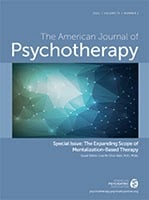Message-Based Psychotherapy Found No Less Effective Than Video-Based Sessions

Delivering psychotherapy for depression via text or voice messages is no less effective than using videoconferencing—and keeps patients more engaged with therapy, according to a report published today in Psychiatric Services in Advance.
Patricia Areán, Ph.D., of the University of Washington, and colleagues recruited 215 adults with depression to receive up to 12 weeks of care from digital mental health care company Talkspace. (This study was funded by the National Institute of Mental Health and not Talkspace.) Half of the adults were assigned to receive psychotherapy via asynchronous text or voice messages, in which the patient could interact with the therapist whenever and how often they wanted. The other half of patients met with a therapist weekly for 30 to 45 minutes over a secure videoconferencing service.
After six weeks, any patients who did not show significant improvement in their depression—defined as at least a 50% reduction in their Patient Health Questionnaire–9 (PHQ-9) score from baseline—were randomly reassigned to receive six weeks of either weekly videoconferencing sessions plus message-based therapy, or monthly videoconferencing plus message-based therapy.
After six-weeks, 28 patients receiving message-based therapy and 27 receiving videoconferencing therapy showed significant symptom improvements. After factoring in the patients who discontinued or did not return their PHQ-9 assessments, the researchers calculated no statistical difference between the efficacy of these two therapy services; that also held true for participating patients after 12 weeks. The researchers also found that patients in each group showed similar improvements in anxiety symptoms and overall functioning at both six weeks and 12 weeks.
The adults who received the message-based service remained engaged with treatment longer, communicating with their therapists for an average of 7.8 weeks, compared with 4.9 weeks for adults in the videoconferencing group.
“The findings are particularly important given the challenges that many people have in accessing traditional psychotherapy,” Areán and colleagues wrote. “The data suggest that psychotherapy delivered via text messages may be a viable alternative to face-to-face or videoconferencing delivery and may allow for more immediate on-demand care.”
For related information, see the Psychiatric News article “Telemental Health Use Remains Robust, but What Does Future Hold?”
(Image: Getty Images/iStock/insta_photos)
Don't miss out! To learn about newly posted articles in Psychiatric News, please sign up here.





